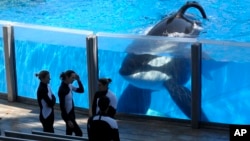A captive whale in a water park in Florida that killed his trainer six years ago is reportedly in grave health.
The killer whale, Tilikum, appears to have a serious bacterial infection.
That information comes from SeaWorld, which has housed the 12,000-pound (5,443 kilogram) whale at its Orlando, Florida, park for the past 23 years.
In 2010, the whale drew international attention when he killed his trainer, Dawn Brancheau, age 40.
The whale has been linked to two other deaths. In 1991, at a Canadian water park, Tilikum was one of three killer whales who dragged trainer Keltie Byrne, 21, under water, according to news reports. In 1999, at SeaWorld Orlando, Daniel Dukes, 27, was found dead over Tilikum’s back. Police said he snuck into the whale tank, news reports said.
On Tilikum’s current condition, this is what SeaWorld said: “Our teams are treating him with care and medication for what we believe is a bacterial infection in his lungs. However, the suspected bacteria is very resistant to treatment and a cure for his illness has not been found.”
The statement added, “Tilikum’s behavior has become increasingly lethargic.”
SeaWorld also released a video that included a statement from SeaWorld veterinarian Scott Gearhart.
“I wish I could say I was tremendously optimistic about Tilikum and his future, but he has a disease which is chronic and progressive and at some point might cause his death," Gearhart said.
The SeaWorld blog estimates Tilikum is 35 years old. That is near “the high end” of the average life expectancy for male killer whales, SeaWorld said.
After the death of Tilikum’s trainer six years ago, SeaWorld and Tilikum were subject of a 2013 documentary, “Blackfish.” It featured interviews with former trainers and whale experts who said some killer whales become depressed and aggressive in captivity.
SeaWorld has been under pressure to stop whale shows from groups such as People for the Ethical Treatment of Animals (PETA). The male killer whales are also known as orcas.
SeaWorld announced last year that, starting in 2017, whale shows in its San Diego, California, park will focus “more on the species' natural behaviors.” It said the new shows will give information about how people can “make a difference for orcas in the wild.”
SeaWorld did not say what changes, if any, would be made for whale shows in its other two parks, in Orlando and San Antonio, Texas.
PETA said SeaWorld immediately should move its whales to sanctuaries, “where they could enjoy a more natural life.”
I'm Bruce Alpert.
Bruce Alpert reported on this story for VOA Learning English. Kathleen Struck was the editor.
We want to hear from you. Write to us in the Comments Section or share your views on our Facebook Page.
________________________________________________________________
Words in This Story
medication -- n. a substance used in treating disease or relieving pain
lungs – n. organs that people and animals use to breathe air
resistant – adj. not affected or harmed by something
lethargic – adj. feeling a lack of energy or a lack of interest in doing things
veterinarian – n. a person who is trained to give medical care and treatment to animals
tremendously – adv. very large or great
optimistic – adj. expecting good things to happen
chronic – adj. continuing or occurring again and again for a long time
expectancy – n. a feeling that something is going to happen
species – n. a group of animals or plants that are similar and can produce young animals or plants
sanctuary – n. a place where animals can be protected in a natural setting





